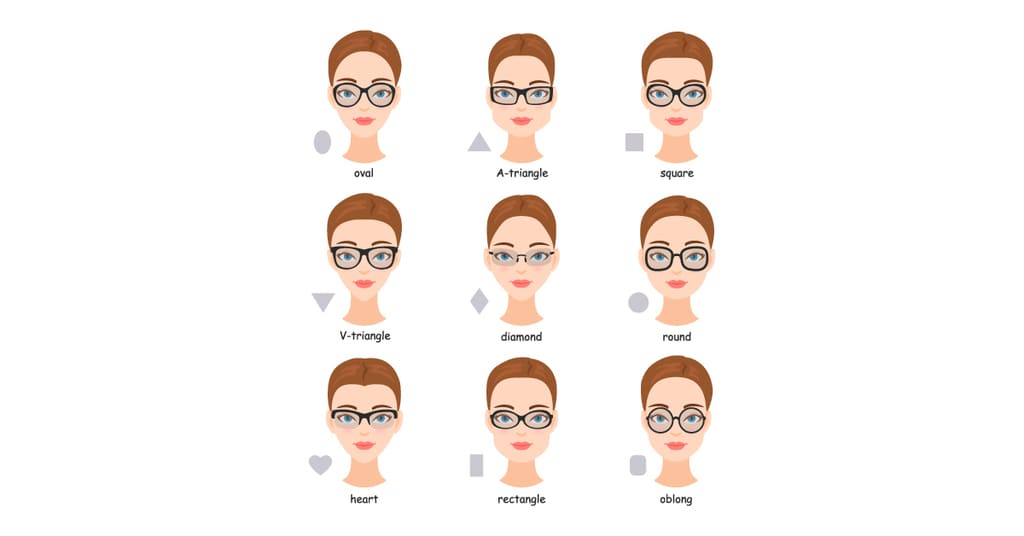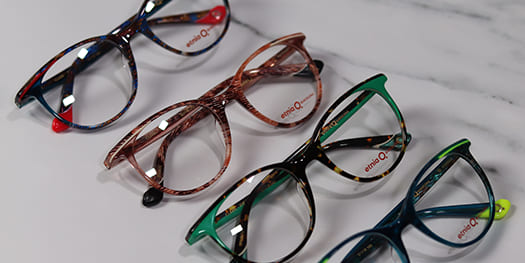Most glasses are manufactured for the average person
There is a mass market for spectacles. Around 70% of people need some form of optical correction, be it glasses or contact lenses and 100% of people over the age of 45 would benefit from some form of spectacle correction (whether they like to admit it or not). That’s a lot of pairs of glasses. Companies that cater for the mass market will usually be those that you have heard of. Those that you could match with a bag, some shoes and possibly your underwear. To make these glasses “mass market appealing”, they need to be safe sizes, safe shapes and safe colours. Great for an average pair of glasses that look a lot like everyone else’s and fit like everyone else’s.
Glasses frames aren’t all created equal
As previously mentioned, lots of glasses are average. So, what elevates glasses beyond average, to the upper echelons of eyewear? The first consideration is the frame itself.
Average eyewear is often made of low- quality metal alloys and injection moulded plastics. These materials are easy to engineer and easy to create in mass. Frames that are created from high quality materials (there is a lovely video showing how good quality “glasses plastic” is made here) and handcrafted to your measurements will be lighter, more comfortable and stand out from the masses.
Spectacle lenses aren’t all created equal
Lots of spectacle lenses are also average. But how can you tell until you put your glasses on? The reality is that you can’t. So, what is it that you are looking for that makes a lens stand out from the crowd? It isn’t the materials, as most Opticians will have access to very similar materials from several different lens manufacturers. Differences appear in the way those materials are treated. Many of you will have had or heard of anti-reflection coated lenses. These coatings have a huge range of quality. If you’ve had glasses that feel like they’re constantly smudgy and difficult to clean, it’s likely that they have a lower quality anti-reflection coating. The difficulty for you is that “the best” in some Opticians won’t match the “the best” in others.
The variety of lens used makes a difference to how well the glasses function in different situations. Glasses come in more than one type and can be used to counter eye fatigue, help night driving and even be personalised to the way you move your eye. Varifocals, used to make distance and reading possible when we reach 45ish fit the comment “not all spectacle lenses are created equal” to the biggest degree because there is a huge difference in function from the lowest quality lenses, to the ones that are truly “the best”. As with anti-reflection coatings, you won’t always get a lot of options.
What is fashionable isn’t always stylish
Fashion in glasses has come a long way in a very short amount of time. We often get hung up on trends and names because those things become fashionable. However, speaking from my experience of “skinny jeans”, what is in fashion doesn’t always suit us. If you were to choose a pair of glasses “in fashion”, they may suit you, they might not. A stylish pair that fit properly, however, don’t need to have a widely recognised name or indeed be in fashion, but will more likely be timeless and will suit you.
Having an expert to collaborate with is important
Your eyewear will possibly be a daily wear item ON YOUR FACE. For that reason alone, it is worth taking the time to find the right ones for you. How do you pick that perfect pair? Do you stand in front of hundreds of pairs and use trial and error? Do you ask a friend or family member to help you? Do you choose your favourite colour, or your favourite shape, or something similar to what you’ve had before? You could try all these things and you may be happy with the outcome. One sure-fire way to reduce the stress is to spend some time with an expert. Sit down with someone that understands your needs and wants, understands face shapes, frame materials, eyewear fitting and lens options. Use the available experts as your personal shoppers. Let someone who has seen thousands of pairs of glasses on thousands of faces help you choose the best eyewear for you.
Here are some simple expert tips

- Get the top of the frame follow the curve of your eyebrow. The frame should line up with or be just below the brow line.
- Have your pupil sitting slightly above the middle of the lens. So that there is more of your glasses below the eye than above.
- Choose a lens shape that compliments how you want to use your face shape. Take the “harshness” off an angular face with more rounded frames and vice versa. If you want to accentuate your face shape then picking the same shaped frame can give a very distinctive look.
- When it comes to colour you are looking to compliment skin tone, eye colour, hair colour and outfit colour. Which to me personally, sounds a bit much. Pick one of these things, or alternatively, don’t. Colour is my favourite element of eyewear and I have pairs in green, white, bright blue and yellow alongside some more conservative options. It’s the element that allows you to catch someone’s eye and display your personality. That isn’t to say that they all need to be wild sky blue pink. You could have an elegant rimless frame with subtle coloured sides if you prefer something a little more discrete, or a bright red hand painted frame with gold foil if you’re looking for a “statement piece”.
- Remember your context and how you wish to be perceived. Are you buying eyewear for socialising and standing out? Are you looking for the discrete, subtle and elegant?. If we were talking about work meetings and conservative colleagues then sometimes the more traditional colours and shapes play into how you want others to see you.
One pair is never the best option
Let’s think about the function of your glasses. Do you have one pair of trousers? Do you have one pair of shoes? One coat? One shirt? One dress? If so then I envy the ease you must have in your clothing choices. However, I ask of course because most people have more than one of each of these things. Why? The regularity of wear is one reason. If you only had one pair of trousers and they split, you’d be in trouble until you could go out to buy another. Another functional advantage of having several pairs is that spectacle lenses are often created for a specific purpose. Distance glasses can be general use, driving use, computer use, UV protection, photochromic etc. A pair of varifocals may be a Jack of all trades, but they are also a master of none. Varifocals give great practicality in an “every distance lens” but trade that off against the field of view, especially at the nearer distances. Many will supplement this trade off with a pair of
reading glasses that enhance the reading experience when sat with their favourite book.Let’s think about how your glasses look. Do you have one pair of trousers? Do you have one pair of shoes? One coat? One shirt? One dress? Is this getting repetitive? Another reason for having more than one of each of these things is that they don’t always suit every situation. You wouldn’t wear your trainers to a wedding and you wouldn’t wear a wedding dress to do the gardening, so why would we use one pair of glasses for every occasion for a whole year or more?
Finally…
Finally, and most importantly, follow this one golden rule above all else. Enjoy what you are wearing. You are likely to wear them alot. Love your glasses and look forward to using them. If you manage to tick this one, then all the other points pale into insignificance.So there you have it, industry secrets delivered to your e-door. You are welcome. I don’t pick my eyewear by myself, so I certainly don’t expect you to! So sit back, have a hot drink and relax while our team bring the experience and eyewear to you!




